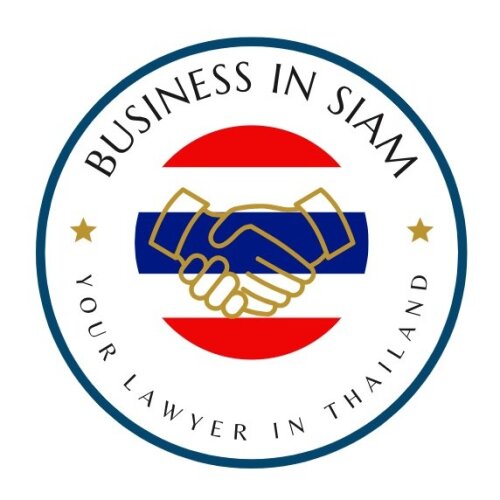Best Investment Lawyers in Bangkok
Share your needs with us, get contacted by law firms.
Free. Takes 2 min.
List of the best lawyers in Bangkok, Thailand
Legal guides written by Smart Legal Solutions:
- Main Legal Measures to Protect Foreign Investment in Thailand
- The importance of the geographical indications for the Thai economy
Legal guides written by SIAM LEGAL INTERNATIONAL:
- Defamation Laws in Thailand: Criminal Charges and Civil Suits
- The State of Thailand’s Long-Term Resident (LTR) Visa Program in 2025
- The Penalties Of Not Filing Your Income Tax Return As A Foreigner In Thailand
Thailand Investment Legal Questions answered by Lawyers
Browse our 3 legal questions about Investment in Thailand and read the lawyer answers, or ask your own questions for free.
- Breech of contract
- My business partner accused me of stealing money from the safe. Banned me from the business and decided I was a silent partner without my consent. Refused to apologise for the unproven and upsetting allegations. I want to sell my shares of the company back to them. I paid 800,000k... Read more →
-
Lawyer answer by SB Law Asia
Our firm (SB Law Asia) are experts in Thai company law and in litigation and dispute resolution. We would be happy to provide you with a free consultation.
Read full answer - Can a foreigner buy a condo unit in Thailand?
- I am French and I would like to buy a condo in Phuket or Koh Samui, am I able to do this?
-
Lawyer answer
There is no limitation in terms of nationality, and as such, any foreigner legally admitted to entering the Kingdom can buy a condominium which is generally a freehold property. It should be noted that foreigner-owned condominium units should not exceed...
Read full answer - Can a foreigner purchase land in Thailand?
- I am from the UK and I would like to purchase some land in Chiang Mai, how can I do this?
-
Lawyer answer
Due to Thai property laws, a foreigner cannot directly purchase land in Thailand; however, there are other alternatives if you wish to pursue this option. The options include; using a company, as foreigners can own land in Thailand if it...
Read full answer
Thailand Investment Legal Articles
Browse our 5 legal articles about Investment in Thailand written by expert lawyers.
- Legal Guide to Real Estate Investment Trusts (REITs) in Thailand
- Real Estate Investment Trusts (REITs) have emerged as an attractive investment vehicle for those seeking to gain exposure to the real estate market without directly owning or managing properties. In Thailand, REITs are governed by a robust legal and regulatory framework that ensures transparency, investor protection, and compliance with international... Read more →
- Conducting Business or Investing in Thailand: The Visas You’ll Need
- Thailand is a popular country among entrepreneurs, investors, and professionals looking to explore new horizons. The cost of living and doing business is relatively low, and the government provides incentives and subsidies for a variety of business activities.Whether you’re looking to invest in or start a company, or just want... Read more →
- Main Legal Measures to Protect Foreign Investment in Thailand
- According to the Board of Investment of Thailand (BOI), during the first quarter of 2021 investment applications in Thailand increased by 80% over the same period of the previous year, led by projects in the medical, electrical and electronic sectors.At Smart Legal Solutions are aware that one of the main... Read more →
About Investment Law in Bangkok, Thailand
Bangkok, the bustling capital of Thailand, serves as the country’s economic hub. It offers a diverse range of investment opportunities, from real estate and manufacturing to the booming technology sector. The investment landscape in Bangkok is regulated under the Foreign Business Act and governed by various agencies to ensure that local and foreign investors can conduct their activities efficiently. The aim is to balance economic growth with sustainable development, thus making Bangkok an attractive destination for investors worldwide.
Why You May Need a Lawyer
Legal assistance in investment is often necessary for several reasons. Navigating unfamiliar legal environments can be challenging, especially when dealing with cross-border transactions. A lawyer can help in the following situations:
- Forming a Joint Venture: To ensure compliance with local regulations and the fair distribution of profits and responsibilities.
- Acquisitions and Mergers: Handling due diligence processes and negotiating terms.
- Regulatory Compliance: Ensuring any foreign investment aligns with Thai laws, including the Foreign Business Act.
- Dispute Resolution: Managing conflicts arising from agreements or breaches of contracts.
- Intellectual Property Protection: Securing and enforcing IP rights for businesses operating in Bangkok.
Local Laws Overview
The legal framework for investment in Bangkok is primarily governed by the Foreign Business Act, which restricts foreign ownership in certain industries. The Board of Investment (BOI) provides incentives for sectors deemed beneficial to Thailand's economic growth. Key aspects include:
- Foreign Business License: Required for foreign entities wishing to engage in businesses restricted under Thai law.
- Tax Incentives: Offered predominantly to encourage investment in areas like technology and renewable energy.
- Real Estate: Foreign ownership is limited, but lease options can extend up to 30 years with potential renewals.
- Corporate Structure: Companies can be structured as limited liability companies, joint ventures, or wholly-owned foreign enterprises under certain conditions.
Frequently Asked Questions
What is the Foreign Business Act?
The Foreign Business Act limits foreign ownership in certain industries within Thailand. Foreign businesses must seek a foreign business license to operate in restricted sectors.
Can foreigners own land in Bangkok?
Foreign ownership of land is generally prohibited. However, long-term leases and investment promotions via BOI might offer alternative solutions.
What is a BOI promotion?
The Board of Investment (BOI) offers promotions for businesses that comply with specific criteria encouraging industry and economic development. These promotions often include tax incentives and easier regulatory processes.
Are there special zones for investment in Bangkok?
Yes, Thailand has established Special Economic Zones (SEZs) to encourage investment, providing perks like tax incentives and streamlined customs processing.
What are the tax implications for foreign investors?
Thailand imposes a corporate income tax rate of 20%, but there are various incentives and treaties that might reduce tax liabilities for foreign investors.
What are the common forms of business entities in Bangkok?
The most common forms are limited companies and joint ventures, which offer limited liability for shareholders.
How do I protect my intellectual property in Thailand?
Register your patents, trademarks, and designs with the Department of Intellectual Property in Thailand to ensure legal protection.
How long does it take to set up a business in Bangkok?
This can vary, but typically, it takes 30 to 60 days to complete the company registration process, depending on the complexity of the business structure.
Is it difficult to repatriate profits from Thailand?
Repatriating profits is possible, but it requires compliance with foreign exchange laws and, often, the approval of the Bank of Thailand.
What is the process for acquiring land for a factory in Bangkok?
While direct land ownership is not possible, foreigners can lease land or set up BOI-promoted projects that might offer greater flexibility regarding land use and acquisition.
Additional Resources
For those seeking further assistance, consider reaching out to the following resources:
- Board of Investment (BOI): Provides information on investment incentives and application processes.
- Department of Business Development (DBD): Offers insights on business registration and regulations.
- Ministry of Commerce: Regulates commercial activities and oversees the implementation of the Foreign Business Act.
- Legal firms specializing in Thai business law: Many international and local law firms can provide tailored advice.
Next Steps
If you find yourself needing legal assistance in investment, start by identifying your specific legal needs. This can include mergers, compliance, or establishing a business entity. Seek recommendations for reputable law firms with a strong understanding of both local and international investment dynamics. Schedule consultations to discuss your case and ensure they have experience dealing with similar situations. Once you've selected a legal advisor, work collaboratively to develop a strategy that aligns with Thai law while achieving your investment goals.
Lawzana helps you find the best lawyers and law firms in Bangkok through a curated and pre-screened list of qualified legal professionals. Our platform offers rankings and detailed profiles of attorneys and law firms, allowing you to compare based on practice areas, including Investment, experience, and client feedback.
Each profile includes a description of the firm's areas of practice, client reviews, team members and partners, year of establishment, spoken languages, office locations, contact information, social media presence, and any published articles or resources. Most firms on our platform speak English and are experienced in both local and international legal matters.
Get a quote from top-rated law firms in Bangkok, Thailand — quickly, securely, and without unnecessary hassle.
Disclaimer:
The information provided on this page is for general informational purposes only and does not constitute legal advice. While we strive to ensure the accuracy and relevance of the content, legal information may change over time, and interpretations of the law can vary. You should always consult with a qualified legal professional for advice specific to your situation.
We disclaim all liability for actions taken or not taken based on the content of this page. If you believe any information is incorrect or outdated, please contact us, and we will review and update it where appropriate.

















